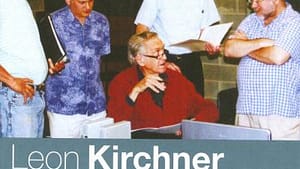Stay in the Loop
BSR publishes on a weekly schedule, with an email newsletter every Wednesday and Thursday morning. There’s no paywall, and subscribing is always free.
Back from the break
PCMS presents the Orion Quartet with Richard Woodhams

What makes the new year happy for chamber music lovers is the return of the Philadelphia Chamber Music Society’s season after a nearly monthlong break for the holidays. Late December and early January can seem as dry as August if you aren’t into Messiah or The Nutcracker, to name two of the many indispositions of the season, along with the Mummers’ idea of wit and the blazing glory of your neighbor’s Christmas lights. But the Orion Quartet brought us back to the musical business of winter.
The distinguished oboist (and Philadelphia Orchestra principal) Richard Woodhams joined the quartet to open the program with Mozart’s Oboe Quartet, K. 370. Mozart wrote 28 works for instrumental quartet: 23 for strings alone, 2 for flute, 2 for piano, and this solitary gem for oboe, as civilized and civilizing a piece of music as he ever wrote.
The piece was written for a particular musician, as was often the case with Mozart. In this case, a particular wind musician — oboist Friedrich Ramm — caught his eye. Though Mozart forgot his name the first time he heard him play, he remembered his “delightfully pure tone,” and Ramm would become his collaborator in several works, including K. 370. It is a 17-minute stretch of wonderfully unfolding melody, and, however Ramm may have sounded in his day, Richard Woodhams has a delightfully pure tone in ours. The quartet, while a display piece, is integrated in sound, although the melodic line lies almost entirely in the oboe. The music lasts just long enough, and, as usual with Mozart, leaves you at the same time willing it to go on and on.
Sometimes respect isn’t enough
Next up was a most welcome rarity, Leon Kirchner’s 1949 String Quartet No. 1. This quartet and its successor both won the prestigious New York Music Critics’ Circle Award, while Kirchner’s third quartet won a Pulitzer, but today Kirchner is now in the category of someone occasionally revived rather than regularly heard. He was five months younger than Leonard Bernstein, and, like Bernstein, a gifted pianist, conductor, and pedagogue in addition to being one the most highly regarded composers of his generation. Perhaps there wasn’t space for anyone else in the room when Bernstein was in it; perhaps his music, while accessible enough by mid-20th-century standards, was a bit too austere for popular tastes. Respect gets you good notices and prestigious commissions; it doesn’t sustain a reputation over the long run.
This is a pity, for his music is strongly profiled, superbly crafted, and always interesting. Kirchner studied with, among others, Schoenberg, and there are instrumental solos and balances in the First Quartet that reflect Webern, although the signal influence on the work is Bartók’s. There’s nothing merely derivative, though, and no point in its uninterrupted 18-minute span that doesn’t reward attention and compel — well, respect.
A peak unlikely to be rescaled
The Orion’s full complement played the Kirchner with deep sensitivity and appreciation. The concluding work of the program was Beethoven’s Quartet No. 12, Op. 127, the first of the late quartets that carried him beyond the heroic conquests of the Razumovsky quartets 18 years earlier into the rarefied atmosphere of his final musical development, a summit not since approached by anyone, and — let’s admit it — not likely to be any more than Phidias or Michelangelo are.
During the years between the Razumovskys and the late quartets, Beethoven composed only two isolated specimens in the medium, the “Harp” Quartet, Op. 74 and the “Serioso” Quartet, Op. 95, both of which extend the language of the Razumovsky set but don’t fundamentally extend it. From the bold opening chords of Op. 127, however, you know you’re in a new sonic space where old harmonic and architectonic assumptions no longer apply.
The sinuous, rising melody that emerges from these chords, partly framed by them, partly a response to them, partly a flight from them, suggests a whole new set of possible relations between thematic materials, and thus in the structure of musical composition and progression itself. Classical music is still dealing with this legacy today, and if Op. 127 gets less than its due, it is perhaps because its four-movement layout seems traditional in contrast to its startling successors, with their even more innovative formal experiments, abrupt shifts and sequences, and more difficult paths to final unity.
The Orion played this work with no less skill and finesse than the other pieces on the program, but its performance left me less satisfied with the result. Contrasts were muted or blurred, and there was a lack of breathability in the music. You can play it smooth in Wagner or Debussy, but Beethoven is a crag, not a hill, especially in the late works. You can brush his coat, but you will never make him a gentleman.
What, When, Where
The Orion Quartet, with guest oboist Richard Woodhams. Presented by the Philadelphia Chamber Music Society. Mozart, Oboe Quartet in F, K. 370; Kirchner, Quartet No. 1; Beethoven, Quartet No. 12 in E-flat, Op. 127. January 10, 2016 at the Kimmel Center, Broad and Spruce Streets, Philadelphia. 215-569-8080 or pcmsconcerts.org.
Sign up for our newsletter
All of the week's new articles, all in one place. Sign up for the free weekly BSR newsletters, and don't miss a conversation.

 Robert Zaller
Robert Zaller